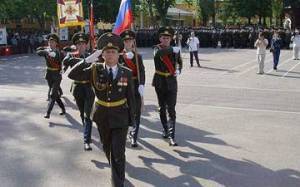Why do they kill higher military education in Russia?
 This year ends story Higher military education in Russia. At least in the form in which it existed until now, it will not be. The Ministry of Defense has suspended recruitment to military colleges for two years, beginning in the summer of 2010. This means in effect the closure of higher military educational institutions. In this case, it is not known whether they will open their doors in two years. It may well be that most of them will never meet students ever.
This year ends story Higher military education in Russia. At least in the form in which it existed until now, it will not be. The Ministry of Defense has suspended recruitment to military colleges for two years, beginning in the summer of 2010. This means in effect the closure of higher military educational institutions. In this case, it is not known whether they will open their doors in two years. It may well be that most of them will never meet students ever.It may seem to someone that two years is a short time, and it is quite possible that the entire high military school of Russia will close down - the measure is temporary and everything will settle down. But in fact, two years is a critical time! All this time, teachers - the elite of Russian education will need to live on something, and now many are forced to break contracts and go into the category of civilians, which the government is probably trying to achieve, because they do not need to be provided at public expense. You do not need, for example, to buy apartments for them.
The closure of military universities in Russia did not begin yesterday. In 2005, 78 was closed by 17 military schools! In the 2008 year - almost three more were destroyed. In the past two years, several more have been “optimized” and “reduced”. And now it was decided to bring the destruction of military education to a logical conclusion - in fact, to close all other higher educational institutions. Including the unique, training specialists of the most important strategic directions. For example, this year the Academy of Aerospace Defense named after Zhukov in Tver is closing.
The reasons for this whole process are simple -
1) the state no longer needs as many military specialists as military higher educational institutions prepare (and there are too many officers with generals — most of them are staff officers);
2) the state can not afford (especially in a crisis) to spend budget funds only to maintain military universities, not getting from them useful returns. The logic of the market is tough - all that is not needed is dying!
Let's try to accept this point of view and see how the closure of military universities solves these problems.
To all appearances, our “Europeanized” and “Americanized” lovers are trying to reform something towards the Western model of military education. More precisely, to the American, where there are practically no military higher educational institutions and their role is played partly by civilian higher educational institutions. In the academy "West Point" a person gets a military basis of knowledge, and the rest gets in civilian universities and colleges. Such a scheme is really quite economical, and in a certain sense the cumbersome Russian military education system loses to it. But loses only in the organization and financial support. But the quality and diversity of knowledge gained is a big question.
The destruction of higher military education is beneficial in an economic sense only in the short term. Here our "reformers" use a completely non-market approach. All economic losses were not calculated (we deliberately keep silent about the strategic losses - after all, we agreed with the logic of the "reformers") in the form of rising unemployment, loss of social orientation of thousands of people who yesterday focused on a military career, the need to spend money on training new military specialists, teachers, to create new infrastructure and connections between educational institutions. So, for example, the president announced that in the coming years there will be a rearmament of the Russian army, and huge funds from the budget will be invested in this. And who counted how much money and strength needed to master this technique? Or is it generally not costly?
In addition, our "reformers" and not reformers at all. Reform implies an evolutionary path of development, and our leaders are itching to destroy everything "down to the ground." Sometimes this revolutionary rush is simply amazing. Only people sincerely believing in their own infallibility and rightness can with such perseverance mercilessly destroy what has already been built. And it seems that our leaders have already formed a stable idea of their own infallibility - otherwise the personality cult with all the consequences (servility has always been widespread).
To destroy the old is not difficult. Creating something viable in return is much more difficult. Close military universities administrative decision is quite simple. It would be more difficult to try to preserve a unique Russian military school, which is already more than 200 years old! The leadership of the country and the Ministry of Defense chose a simple path. But will it be easier for all of us to live?
Information